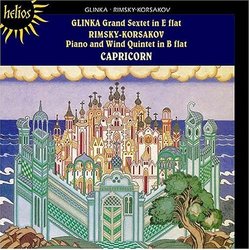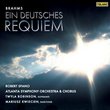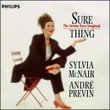| All Artists: Mikhail Glinka, Nikolai Rimsky-Korsakov, Capricorn Title: Glinka: Grand Sextet in E flat; Rimsky-Korsakov: Piano and Wind Quintet in B flat Members Wishing: 0 Total Copies: 0 Label: Hyperion UK Release Date: 4/13/2004 Album Type: Import Genre: Classical Styles: Chamber Music, Historical Periods, Classical (c.1770-1830) Number of Discs: 1 SwapaCD Credits: 1 UPC: 034571151731 |
Search - Mikhail Glinka, Nikolai Rimsky-Korsakov, Capricorn :: Glinka: Grand Sextet in E flat; Rimsky-Korsakov: Piano and Wind Quintet in B flat
 | Mikhail Glinka, Nikolai Rimsky-Korsakov, Capricorn Glinka: Grand Sextet in E flat; Rimsky-Korsakov: Piano and Wind Quintet in B flat Genre: Classical |
Larger Image |
CD DetailsSimilar CDsSimilarly Requested CDs
|
CD ReviewsExcellent works, albeit little-known David A. Beamer | Clawson, MI United States | 09/03/2006 (5 out of 5 stars) "This CD contains two works I would call "micro-masterpieces". The music does not rise to the level of, say, the Beethoven Septet or the two big Clarinet Quintets (Mozart and Brahms), but this is music that deserves more attention than it gets. Glinka was one of the earliest composers from Russia who found an audience in Western Europe. This Sextet is indeed Grand -- the composer uses the piano to augment the string quintet in a way that approaches symphonic proportions. Just the first few bars tell you that you're in for something special. Glinka acheives a measure of musical ingenuity, combined with attention to the "Classical" form that marks him as the first home-grown Russian composer to be seriously reckoned with. Rimsky-Korsakov became a more well-known and appreciated composer than the earlier Glinka. Although not "properly trained" in composition, he acheived a place in Russian classical music equal to that of the more-famous Musorgsky. Truth be told, I got this CD primarily for the last movement of the Rimsky-Korsakov Quintet. From the outset of the movement, the composer sets in motion a delicate repetitive rhythmic idea that carries the whole movement on gossamer wings. This is the kind of writing that is difficult to pull off -- serious enough for the "longhair" music fans, but delicate enough to entrance a 3-year-old." TOPIC OF CAPRICORN DAVID BRYSON | Glossop Derbyshire England | 03/18/2007 (5 out of 5 stars) "These two works seem top-notch in their way to me, and so do the performances here. Glinka was contemporary with Berlioz, and according to the liner-note they met in Italy and Glinka came under the influence of the fiery Frenchman. I could never have told. His Grand Sextet sounds to me entirely a product of the German tradition, and none the worse for that. You would know it was not Mendelssohn, but the general effect is not unlike Mendelssohn's, and the music seems good enough to me to keep company with Mendelssohn's own chamber works. What I would have been interested to know is whether Glinka was influenced by Schubert's Trout Quintet, which also incorporates a double-bass, although Schubert has only one violin to Glinka's two. Rimsky's Quintet for piano and wind seems to me finer still. There is a quotation from the composer to the effect that the first movement is classical in the manner of Beethoven, but again what I would have liked to be told was whether Rimsky had in mind Beethoven's similarly-scored quintet (with oboe instead of flute), this in turn being heavily influenced by Mozart's startling masterpiece for that combination.
However that may be, Rimsky's actual music does not remind me of Beethoven or Mozart in the slightest. The energetic first movement, `classical' or no, is about as far from Mozart's languid sublimity as can be imagined, the slow movement has real depth and strength to it, and throughout the work, but particularly in the comic finale, there is what I take for the early manifestation of a distinctively Russian idiom. I would even say (meaning no slight on Beethoven) that Rimsky's quintet is nearer in stature to Mozart's than is his own pleasant but derivative early work. Performance and recording seem to me completely admirable. The account was originally recorded in 1984 in digital sound from the outset, and it lets us hear with fidelity some stylish and accomplished playing from the group calling itself Capricorn although the players are named individually as well. Only the pianist is common to the two performances, and he is equally at home and elegant in both. It is probably always a little risky to include a double-bass in chamber works, but the player here is extremely tactful, adding a pleasant richness to the tone without letting it get out of proportion. The members of the regular string quartet combination are as unfailingly right and appropriate in Glinka as their counterparts are in Rimsky, and the recording engineers have treated them just as handsomely too. All in all, this is an uncommonly pleasant disc of some out-of-the-way music that invites repeated listening for simple uncomplicated enjoyment without challenging us as listeners. The liner-note touches in a little interesting background detail, and the frontispiece of the leaflet has a particularly beautiful picture taken from a staging of one of Rimsky's operas. I'm not certain whether I had heard of the Capricorn ensemble before, but I suspect I ought to have and I shall be looking for them from now on." |










